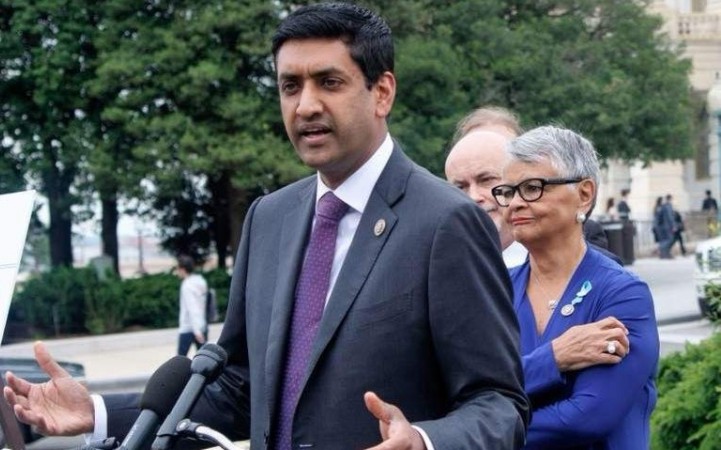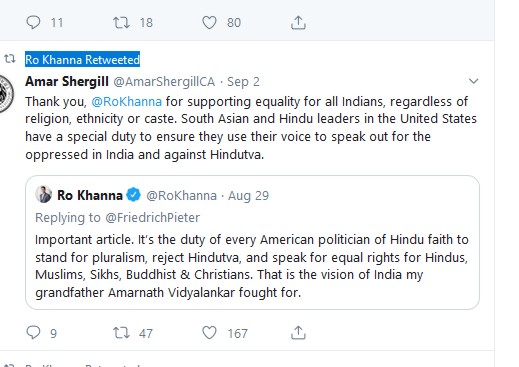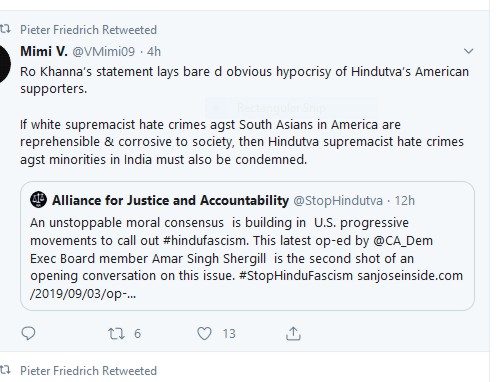Ro Khanna’s recent tweet in reply to an article critiquing Hindutva – and speaking up for the equal rights of Hindus, Muslims, Sikh, Buddhist & Christian Indians –marks a shift in South Asian diaspora’s debate and compels a new debate among South Asian Americans

Congressman Ro Khanna (D-Fremont) tweeted the following on Aug. 29: “It’s the duty of every American politician of Hindu faith to stand for pluralism, reject Hindutva, and speak for equal rights for Hindus, Muslims, Sikhs, Buddhist & Christians.” There is more. The dapper Congressman, who was replying to an article by Pieter Friedrich also said, “ That is the vision of India my grandfather, Amarnath Vidyalankar fought for.”

That such a comment should draw attention and of course the predictable string of ‘hate’ from the hired trolls of the current Indian regime is expected. That significant voices from the South Asian diaspora are challenging majoritarian hegemony is even more significant.
Last month, Caravan published a longform exposé by South Asian analyst, Pieter Friedrich. The article analysed the history of Hindutva organizing in the US and how these ultra-right organisations cultivated political allies. Today, Congresswoman Tulsi Gabbard tops the list. She is a candidate for the US presidency, who has developed deep ties to the Hindutva movement! She not only solicits money from American Hindutva organizers –even inviting leaders of Hindutva organisations to her intimate wedding ceremony – but is also seen at their important functions. On Aug. 12, the author of the Caravan article tweet-replied to a Gabbard campaign post, providing a link to the piece. Khanna also replied. Some of the exchanges are interesting:

Ro Khanna’s statement was immediately recognized by South Asian politicos as a seismic shift in Indo-centric politics. Amar Shergill in SanJoseInside said, “He is the highest ranking American elected official of Indian origin, with a deep understanding of and connection to South Asian politics, and, yet, he stated in decisive moral terms that the dominant political ideology of India must be rejected as a matter of fundamental human rights… This is brave new ground for South Asian policy discourse in the US.”
Khanna’s statement on twitter drew the predictable torrent of hate and criticism, too. While pro-Hindutva political supporters launched their offensive, the progressives and anti-Hindutva activists welcomed this courageous stance. However, the full measure of Khanna’s words are yet to be felt. Modi and the Indian government are certain to be dismayed by this challenge to the inroads they have made within certain sectors of the Indian community in the US. In coming months, this debate within the South Asian American community will deepen. It will also be reflected in the Democratic Party that will finally be compelled to grapple with the morality of Hindutva. Khanna’s statement goes to the heart of this debate by laying bare the obvious hypocrisy of Hindutva’s American supporters. Can South Asian Americans claim to support civil rights and equality for all Americans while simultaneously advocating for religious supremacy that results in violence –often rape, torture, murder and oppression of minorities– in India?
Over the past months, Sabrangindia has been reporting on other such signs of change among the Indian diaspora. Sadhana, a coalition of Hindus in the United States and around the world formed to assert a progressive Hindu voice that speaks up –and acts for –progressive social values and social justice. This group, with about 2000 followers on Facebook, seems like a small online group but is countering Hindutva hatred with its counter-narrative. Their website blog is a treasure trove of articles on current issues with parallels drawn from Hindu scriptures and literature.
Their website says, “Since 2011, Sadhana has been building a progressive Hindu movement. We practice our sadhana, or faith in action, by advocating for those social justice principles we believe are at the heart of Hinduism. We have mobilized Hindus in New York City and beyond to stand up for social justice causes including environmental justice, racial and economic justice, gender equity, immigrant rights, and anti-casteism. We bring a Hindu voice to the interfaith justice movement. We have chapters and members around the country and abroad. We engage and mobilize progressive Hindus nationally and internationally using social media.”
“ I simply don’t accept that Hindu people don’t care about lynching, mob violence, says Sunita Vishwananth, founder member of Sadhana, USA has stated publicly while continuing to mobilise Hindus in the US against Hindutva.
The history of India, and the South Asian subcontinent is complex and diverse with a plethora of language, religion, ethnicity and caste. Indian democracy has been managing this complexity with mixed success since its independence from British colonial rule in 1947. Despite being founded on constitutional and republican principles of equality and non-discrimination, the inroads of majoritarian politics have vitiated the political and public sphere: violence against minorities has often been a path to electoral success. Although there are many examples, the most recent and infamous are the 1984 Genocide of Sikhs in Delhi and the 2002 Gujarat Massacre of Muslims. Post 2014 and the election of a Hindu supremacist (read Hindutva) government in the saddle, fear and hatred against minorities has reached new dimensions. (See the US Commission on International Religious Freedom Reports for detail.) Modi’s political party (BJP) and its cultural counterpart organizations (RSS, VHP, etc.) form the backbone of the Hindutva movement.
Every institution of Indian democracy has been permeated by men and women who carry this majoritarian ideology. Progressive movements across South Asia have been mobilizing to ask the world for solidarity as they continue to bravely resist the volatile conditions in the region. The Hindutva right have been keenly set on a path to influence U.S. policy from within the American political system, which makes these recent elements noteworthy.